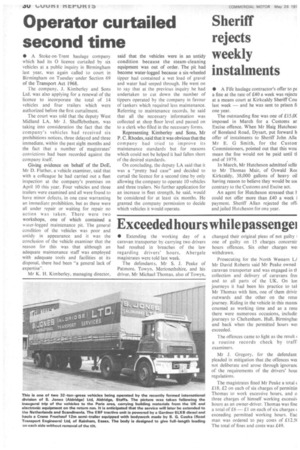Operator curtailed second time
Page 32

If you've noticed an error in this article please click here to report it so we can fix it.
• A Stoke-on-Trent haulage company which had its 0 licence curtailed by six vehicles at a public inquiry in Birmingham last year, was again called to court in Birmingham on Tuesday under Section 69 of the Transport Act 1968.
The company, J. Kimberley and Sons Ltd, was also applying for a renewal of the licence to incorporate the total of 14 vehicles and four trailers which were authorized before the first curtailment.
The court was told that the deputy West Midland LA, Mr J, Shufflebotham, was taking into consideration the fact that the company's vehicles had •received six prohibitions notices, three delayed and three immediate, within the past eight months and the fact that a number of magistrates' convictions had been recorded against the company itself.
Giving evidence on behalf of the DoE, Mr D. Flather, a vehicle examiner, said that with a colleague he had carried out a fleet inspection at the company's premises on April 10 this year. Four vehicles and three trailers were examined and all were found to have minor defects, in one case warranting an immediate prohibition, but as these were all under repair or waiting for repair no action was taken. There were two workshops, one of which contained a water-logged maintenance pit. The general condition of the vehicles was poor and untidy in appearance and it was the conclusion of the vehicle examiner that the reason for this was that although an adequate maintenance staff was employed with adequate tools and facilities at its disposal, there had been "a general lack of expertise".
Mr K. H. Kimberley, managing director, said that the vehicles were in an untidy condition because the steam-cleaning equipment was out of order. The pit had become water-logged because a six-wheeled tipper had contained a wet load of gravel and water had seeped through. He went on to say that at the previous inquiry . he had undertaken to cut down the number of tippers operated by the company in favour of tankers which required less maintenance. Referring to maintenance records, he said that all the necessary information was collected at shop floor level and passed on to a clerk who filled in the necessary forms.
Representing Kimberley and Sons, Mr P. C. Rhodes, said that it was obvious that the company had tried to improve its maintenance standards but for reasons which could not be helped it had fallen short of the desired standards.
On concluding, the deputy LA said that it was a "pretty bad case" and decided to curtail the licence for a second time by only allowing the company to operate 10 vehicles and three trailers. No further application for an increase in fleet strength, he said, would be considered for at least six months. He granted the company permission to decide which vehicles it would operate.




































































































